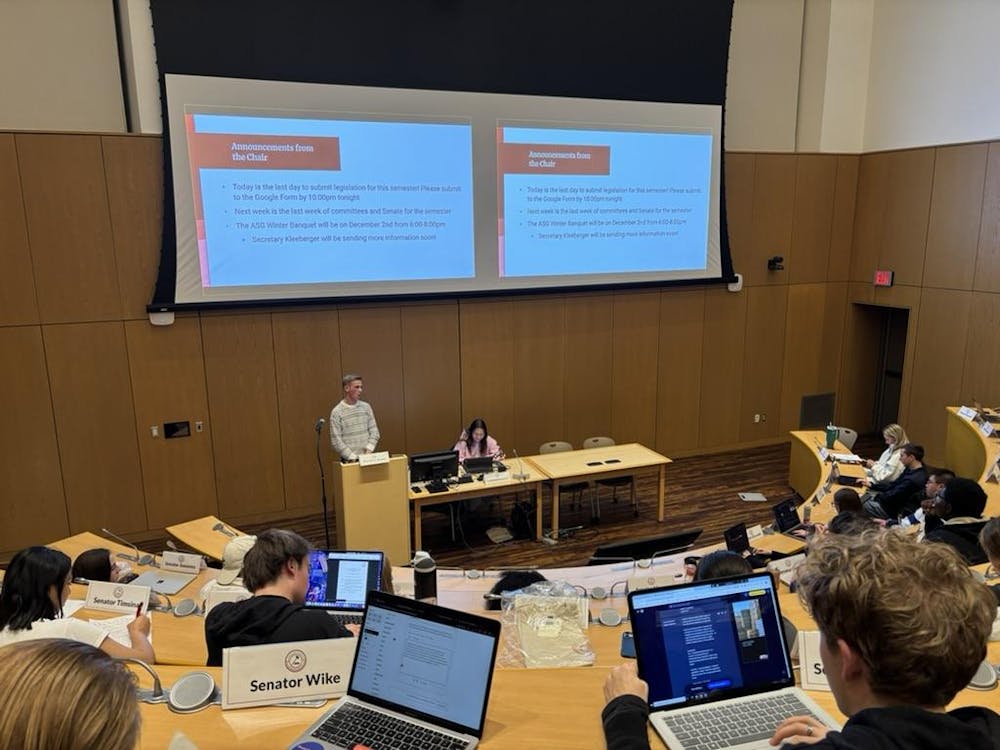The Associated Student Government (ASG) passed a resolution to establish an ASG fitness and wellness series and a resolution to amend the university absence policy in regard to athletic events, as well as debated the university’s course overload fee.
Senator Hannah Pickerrell proposed a resolution to establish an ASG fitness and wellness series. Previously, ASG had voiced concerns about the price of fitness classes at the Rec. Several senators said the classes were too expensive, but that it was difficult to consistently get exercise in the winter without them.
“Some of the classes that we were just brainstorming — we're still open to any ideas —but some of them are rock climbing, yoga, mat pilates, stress management, dog therapy, group runs, martial arts, self defense, horse therapy, dance classes and anything you guys can think of,” Pickerrell said.
Pickerrell said ASG was talking with student clubs that might be willing to lead the fitness classes for free, but said ASG would help fund them. ASG voted to pass the bill.
Senator Quinten Ahler proposed a resolution to amend the university’s excused absence policy as it applies to varsity athletic events. Currently, Miami’s policy only allows excused absences for religious observances, military training , pregnancy and related conditions.
“I've had several classmates in the past who have been on sports teams, and they've had a game the same day as a midterm, and the teacher didn't allow it,” Ahler said. “Some of these students are here on scholarship, and they have to attend their teams' programs.”
Enjoy what you're reading?
Signup for our newsletter
The resolution will be shared with the University Senate Chair Academic Policy Committee, the senior director of Student Success and Retention and the assistant dean of students, with the goal of collaboration.
Senator Charles Amara also discussed future resolutions that would propose additional amendments to the absence policy for university sanctioned events. He cited his own experience involving a university sponsored event.
“For example, I am part of the government waste network, and we do trips to Columbus at the state house twice a year,” Amara said. “Last semester, I was taking [U.S. Congress] and I gave [the professor] my letter signed, and he said that he wouldn’t excuse me, even though this was a class about Congress, and I was taking a trip through the school to go to Congress.”
Senator Nick McClure proposed a resolution to request the university eliminate the course overload fee. The overload fee is incurred when a student enrolls for more than 18 credit hours in a single semester, and costs over $600 per credit hour over the limit.
Several senators agreed that they would like to see the overload fee eliminated or reduced. Senator Evelyn Patches said the resolution would be particularly beneficial for students for whom the overload fee may be a deterrent from taking courses.
“There are a lot of majors that are highly prescriptive and that just doing major requirements, you're already at 17 credit hours, which makes it really hard to fit in all of the other requirements,” Patches said. “Creating more monetary limits for students who can't be here for more than four years when, for example, their major doesn't really allow for a lot of wiggle room. I just don't think that's really a reasonable request for college students.”
Some senators were concerned about the loss of revenue for the university, and wanted to see more data about the current allocation of that funding, and potential impacts of eliminating the fee.
Senator Alex Oliver said issues scheduling or course offerings may be the true culprit.
“Maybe we need to consider why people have to take more credit hours,” Oliver said. “I know this is not directly related to this bill, but I think maybe rather than proposing the fees are eliminated or lowered, we should consider the accessibility of classes.”
ASG will meet again on Tuesday, Nov. 17, at 6 p.m. in the Joslin Senate Chambers.




